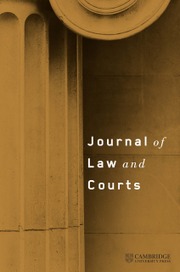Article contents
The Influence of Procurator Generals in Constitutional Review: The Case of Bulgaria
Published online by Cambridge University Press: 21 October 2022
Abstract
After democratic transitions, many Eastern European countries reformed their political institutions in a piecemeal fashion. Focusing on the Bulgarian Constitutional Court from 1992 to 2012 and the Soviet-style procurator general, we analyze how legal reforms operate in practice in transitional societies. Using original data, we find that judges are influenced by the powerful and unaccountable procurator general. Judges’ decisions to strike down laws also are guided by alignment with their or their appointers’ political preferences and the opinions of interested parties in amicus briefs. The study has implications about interbranch relations and the role of procurator generals in constitutional review.
- Type
- Articles
- Information
- Copyright
- © 2021 by the Law and Courts Organized Section of the American Political Science Association. All rights reserved.
Footnotes
This research was supported in part by the University of Houston’s College of Liberal Arts and Social Sciences’ small grant program. We thank Radovest Apostolov and Christo Kaludov for research assistance. We thank Chris Zorn for a useful discussion at the meeting of the International Political Science Association’s section on comparative judicial studies (RC 9) held in Prato, Italy, in 2019, and we are thankful for comments on prior drafts or presentations from Brad Epperly, Diana Kapiezewski, Niki Marinov, Kelly Rader, and Kristen Renberg.
References
- 1
- Cited by




